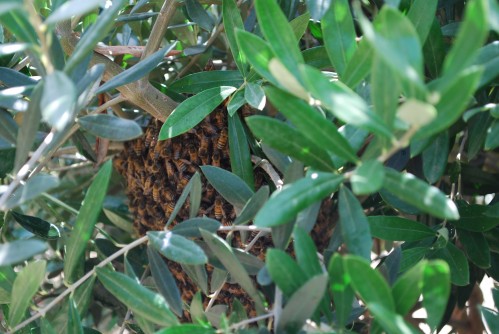Honey Bees Are Great For Your Garden
 I know that nothing is a coincidence. Just last week I experienced my second honey bee swarming. The first one was in a friend's backyard a few years ago, and the second one was last week, close to our vineyard by the "Little Ollie" olive trees. At first I noticed a tiny dense dark cloud moving above our vineyard, with motion and fervor. Following this sight with my eyes for a while, it dawned on me that it was a swarm of honey bees. Upon further investigation and with the mission to water our "Little Ollie" olive trees, I spotted the swarm, quiet and resting under one of the branches. I wasn't afraid of them, and knew that they would be soon travelling on.
I know that nothing is a coincidence. Just last week I experienced my second honey bee swarming. The first one was in a friend's backyard a few years ago, and the second one was last week, close to our vineyard by the "Little Ollie" olive trees. At first I noticed a tiny dense dark cloud moving above our vineyard, with motion and fervor. Following this sight with my eyes for a while, it dawned on me that it was a swarm of honey bees. Upon further investigation and with the mission to water our "Little Ollie" olive trees, I spotted the swarm, quiet and resting under one of the branches. I wasn't afraid of them, and knew that they would be soon travelling on.
Swarming is an important part of the honey bee reproductive life cycle, and how they create new colonies for the new and old queen bees. Scouts from the swarm are sent out to find a new suitable spot for a permanent hive. In the mean time, the swarm rests, patiently protecting the queen bee, and is usually not aggressive. If you find a swarm, it is best to leave it alone. Do not spray the swarm with insecticide. Chances are the swarm will be there for only a day or two, and then move on. Contact a professional beekeeper, or your local Cooperative Extension office for questions and assistance.
We all have heard about the alarming diminishing honey bee populations in our country today. There is speculation that the bee populations might be experiencing repercussions from global warming, harmful effects from pesticides in our environment, and even experiencing some pest or fungus ravaging them. The truth is, we really don't know what is happening to our honey bee populations. This is devastating to our agricultural crops, especially almonds, and trickles down to our very own backyards, with our flower and vegetable gardens. We need bees for pollination, and of course for the golden nectar, honey.
Coincidentally last week, a special garden friend recently told me about Gretchen LeBuhn, and The Great Sunflower Project. Gretchen LeBuhn is a Bay Area biologist, who started this "grass roots" project in 2008, with little money and realistic expectations. She created a website where people could sign up, receive the specific "Lemon Queen" sunflower seeds, and then count the number of bees that visit these blooming sunflowers in their yards. This projected has blossomed to the point where she now has bee-data feedback from people in all 50 states, plus Canada. Tens of thousands of volunteers, and growing, are very concerned about the plight of the honey bee, and want to help her cause. As Gretchen LeBuhn states on her website at the bottom, "Bees: Responsible for Every Third Bite of Food".
For more coincidence, Sunset magazine's current August 2009 issue features Gretchen LeBuhn in a two page article, called "Hive Minds", page 54.
I have signed up, and you hope you will , too. Are you already part of The Great Sunflower Project? What are you finding in your own backyard with bees? All of these coincidences are a wake-up call, to help with the plight of our honey bees.
